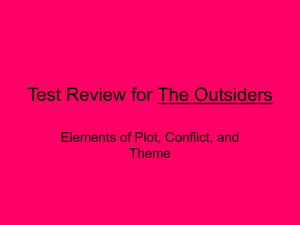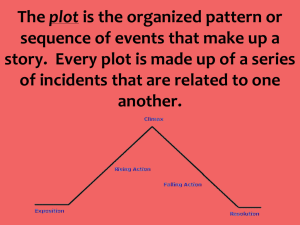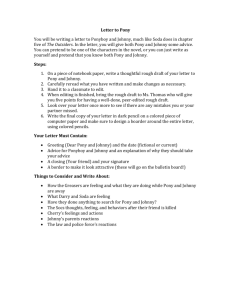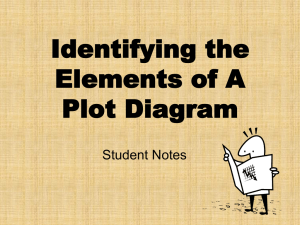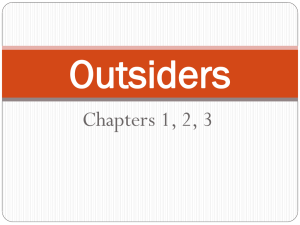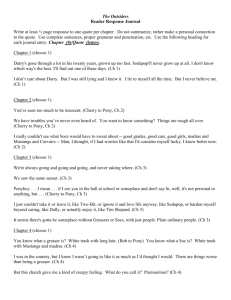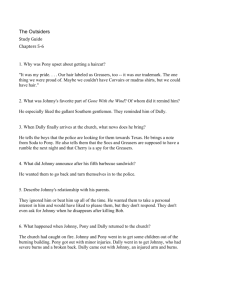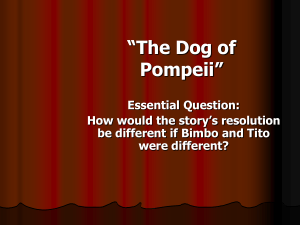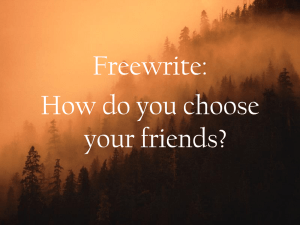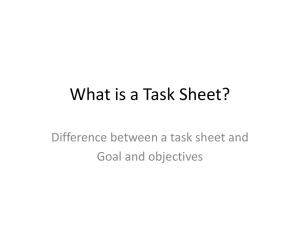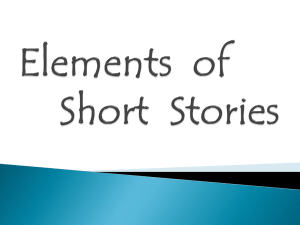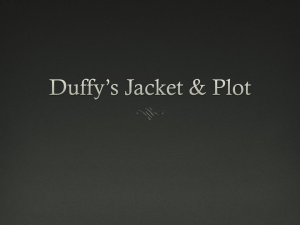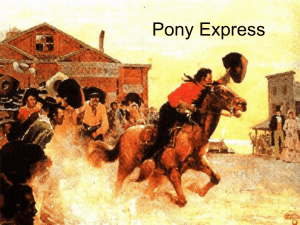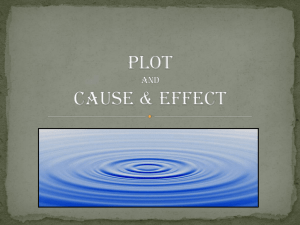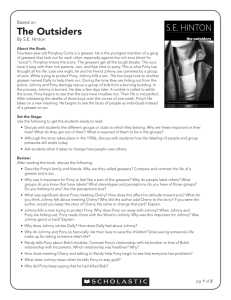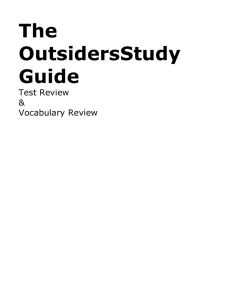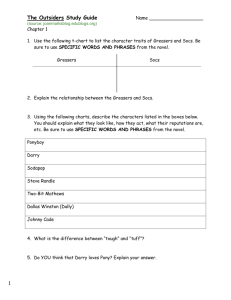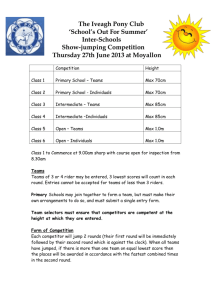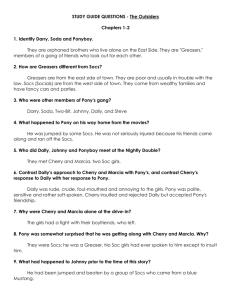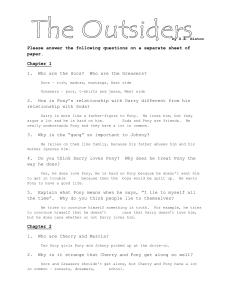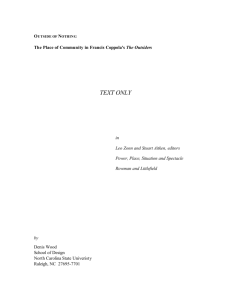Identifying the Elements of A Plot Diagram
advertisement
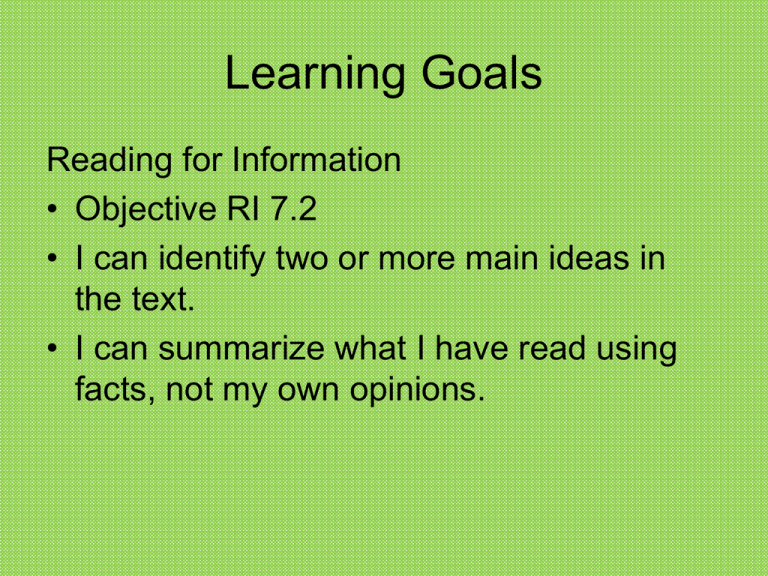
Learning Goals Reading for Information • Objective RI 7.2 • I can identify two or more main ideas in the text. • I can summarize what I have read using facts, not my own opinions. Learning Goals Reading for Information Objective RI 7.3 • I can explain how the people, events, and ideas in the text influenced the events. Review of Jack and The Beanstalk • The story of Jack and the Beanstalk is all fresh in our memory. Today we are going to put these events of this story into a Plot Diagram as we begin our review of Literary Terms used in 7th grade. Identifying the Elements of A Plot Diagram Plot Diagram 3 2 1 4 5 Plot (definition) • Plot is the series of events in a story that explain to the reader what is happening. One of the easiest ways to understand plot is to look at the mountain shaped plot diagram and think of story in terms of climbing a mountain. 1. Exposition • Stage 1 - Exposition • Exposition is at the base of the mountain or the beginning of the story. This is where the author sets up the story including characters, setting, and main conflicts. 2. Rising Action • This part of the story begins to develop the conflict(s). A building of interest or suspense occurs. 3. Climax • The Climax is the turning point of the story. You have reached the top of the mountain and you cannot go any further, you have to turn and go down. This point in the story is when things finally start to move in a different direction and it may not always be a positive direction. 4. Falling Action • Falling Action occurs after the climax as things start to work themselves out in the story. You are coming down the mountain just as you are coming down from the excitement of the climax. 5. Resolution • The Resolution is the solution to the problem as you have reached the bottom of the mountain. The solution might not be what you want, but the conflict has been resolved. • The following literary elements will be discussed as we study: • Plot: The chain of related events that explains to us what happens in a story • Conflict aka "the Hook": A struggle between two opposing characters or forces • Character: A person, animal, or imaginary creature in a story, play, or another literary work • Setting: The time and place of a story • Theme: The general idea or message about life that is revealed through a work of literature Putting It All Together 1. Exposition 2. Rising Action Beginning of Story Middle of Story 3. Climax 4. Falling Action 5. Resolution End of Story Application • You are going to be given events from Outsiders and you are going to determine in which order they should appear on your plot diagram. Major Episodes: • • • • • • • • • Daily is killed by the police. Pony and Johnny hide out in Windrixville. Pony makes up with Darry at the hospital. Pony accepts that Johnny has died. Johnny kills Bob. The gang rescues Pony when he is jumped by the Socs. The greasers beat the Socs in the rumble. The Socs confront Cherry and Marcia with the greasers. Pony, Johnny and Dally rescue the children in the burning church. Major Events • • • • • • • • • Pony has to write about all his adventures with the gang. Dally is upset, so he went and robbed a store Johnny dies in front of Pony and Dally The greasers win the rumble and they all celebrate. Johnny gets burned while he tried to save kids from the burning church. Pony and Johnny hide in the vacant church. Bob and Randy tried to drown Pony. Johnny killed Bob and the rest of the Socs ran away. Ponyboy almost got jumped but the gang came and scared the Socs. We meet Ponyboy and the gang. It is the summer of 1960. A3tud 7 S ud 24 ie e4nc nt nt's 20 3 4 9e 8 2 3 4 5 pe is d r o Rubric Elements of Plot Organization Subject Knowledge Mechanics 1 2 3 4 Poor Fair Good Excellent Audience cannot understand presentation because there is no sequence of information. Audience has difficulty following presentation because student jumps around. Poor Fair Student does not have grasp of information; student cannot answer questions about subject. Poor Student's presentation has four or more spelling errors and/or grammatical errors. Student is uncomfortable with information and is able to answer only rudimentary questions. Fair Presentation has three misspellings and/or grammatical errors. Student presents information in logical sequence which audience can follow. Student presents information in logical, interesting sequence which audience can follow. Good Excellent Student is at ease with expected answers to all questions, but fails to elaborate. Student demonstrates full knowledge (more than required) by answering all class questions with explanations and elaboration. Good Excellent Presentation has no more than two misspellings and/or grammatical errors. Presentation has no misspellings or grammatical errors.
